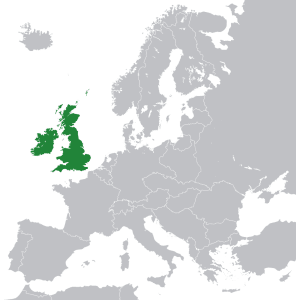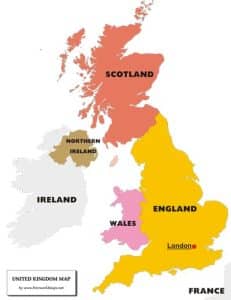Sovereignty, Authority, and Power in Britain
- Great Britain has the oldest democratic tradition of any country in the world, and as a result, has many sources of authority and power that provide stability and legitimacy.
Social Compacts and Constitutionalism
- The legitimacy of Britain’s government has developed gradually, so that today tradition is a primary source of stability.
- Like so many other advanced democracies in Europe, traditional legitimacy for many years was based on the belief that an hereditary ruling family had the right to rule.

- Although the tradition includes a monarchy, the limitation of the king’s power began early, until the power of Parliament gradually eclipsed that of the king by the end of the 17th century.
- Today most British citizens accept democracy as a basic component of their government.
- With the notable exception of Protestant/Catholic conflicts in Northern Ireland, most British citizens accept a church/ state relationship in which the church does not challenge the authority of the government.
- Ironically, the country that influenced the development of so many other modern democracies has never had a written constitution as such (The UK is often said to have an ‘unwritten’ constitution. This is not strictly correct. It is largely written, but in different documents. But it has never been codified, brought together in a single document).
- Instead, the “constitution” has evolved over time, with important documents, common law, and customs combining to form what is often called the “Constitution of the Crown.”
- It reflects a large amount of nationalism, or pride in being English.
- It also reflects insularity, or the feeling of separation from the continent of Europe.
- In modern times, insularity has caused Britain to have a cautious attitude toward participation in the European Union.
- When most of the EU members accepted the euro as a common currency in January 2002, Britain refused, and instead kept the English pound.

Devolution and Constitutional Reform
- The British government is still a unitary one, with the most authority emanating from London.
- However, continuing desire by the Scottish and Welsh for their independence and the problems with Northern Ireland have led to the development and implementation of the policy of devolution, or turning over of some political powers to regional governments.
- Even before Margaret Thatcher delayed the process when she took office in 1979, the Labour party supported devolution.
- Devolution is the transfer of powers and funding from national to local government.
- It is important because it ensures that decisions are made closer to the local people, communities and businesses they affect.

- However, a 1977 referendum to create Scottish and Welsh assemblies failed.
- In 1999, though, referendum (a general vote by the people on a single political question that has been referred to them for a direct decision) in both regions passed, and each now has its own regional assembly, which has powers of taxation, education, and economic planning.


Northern Ireland
- In the 1998 Good Friday Agreement, a parliament was set up for Northern Ireland as well, although London shut down its activities after violence broke out in 2002.
- The Northern Ireland Assembly remained suspended for almost five years, not reopening until May 2007.
- A new challenge was presented to the Assembly in early 2009, when two British soldiers and a police constable were killed and dissident republican terrorists claimed responsibility for both killings.
- These first murders of members of the security forces since 1998 brought thousands out in peaceful protest rallies across Northern Ireland.
- Some observers found hope in the response by political leaders of Sinn Fein, the Democratic Union Party, and the English boss of the Northern Ireland police, who appeared and were photographed standing shoulder-to-shoulder outside the Northern Ireland Assembly.
- Just how much these new parliaments will affect London’s authority is yet to be seen.
- Devolution has also included the creation of the office of mayor and a general assembly for London, giving the city more independence from the central government.

Scottish Independence

- In recent years, the movement for Scottish independence has gained momentum, coming up for a vote in a referendum in September 2014.
- The Scottish Parliament set the arrangements for the referendum in November 2013, when it passed the Scottish Independence Referendum Act, following an agreement between the Scottish and the UK governments.
- The campaign was intense, with both sides presenting heated arguments for their points of view.
- The question was “Should Scotland be an independent country?” The “No” side won with 55.3% of the voters, while 44.7% voting “Yes.”
- The voter turnout of 84.6% was much higher than for any election or referendum in the United Kingdom in recent memory.
- Although the campaign for independence failed, it has many supporters, and most believe that the issue remains a viable one.

- Some critics have argued that devolution should be only one step toward modernizing the political system.
- Other reforms under consideration include a written Bill of Rights for individual citizens, a written constitution, freedom of information, and a new electoral system.
- One crucial reform – proportional representation – was rejected by British voters in 2011, but its supporters are still numerous.
- Whatever reforms are made, Britain still retains a strong attachment to its many traditions, and the government’s long lists of accomplishments are not all in the past.
- As the nation redefines both external and internal political relationships, Britain still serves as a role model for the development of democratic traditions in the modern world.

